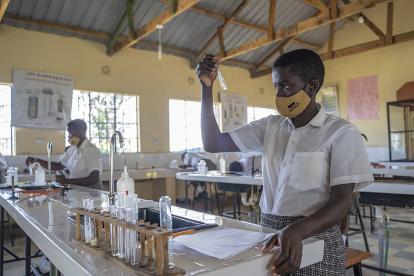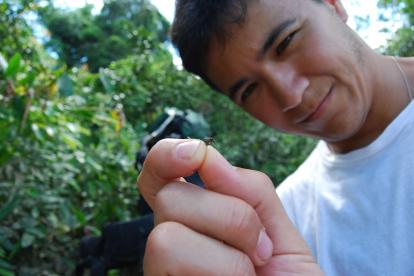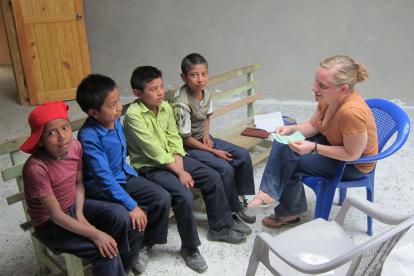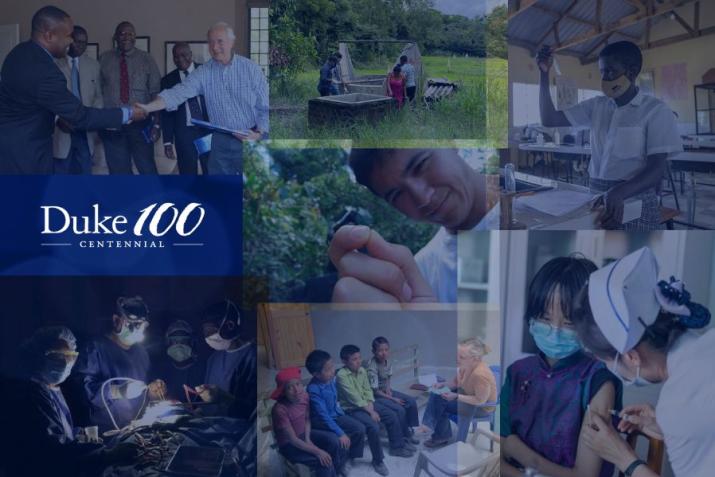In 2024, Duke University is celebrating its centennial, marking 100 years since the commitment from the Duke family that helped turn Trinity College into one of the world’s leading universities. While the Duke Global Health Institute has existed for less than one-fifth of that century, the centennial is a moment to reflect on Duke’s legacy of global engagement, which in many cases predates the formal establishment of the institute in 2006. We could pick any number of countries or projects that highlight Duke’s rich history of locally grounded global health research and education, but here are seven places around the world where those partnerships have flourished.
Tanzania
One of Duke’s deepest partnerships on global health sits in the shadow of Mount Kilimanjaro in northern Tanzania. It dates to the late 1990s, when Tanzania’s second medical school opened as part of the Kilimanjaro Christian Medical Centre. Duke and KCMC collaborated on a series of training grants to support research on some of the region’s key health issues, including HIV/AIDS, cancer, trauma care and mental health. That has sparked a wide-ranging partnership, with Duke researchers working alongside Tanzanian colleagues to mentor researchers and clinicians who are taking on issues ranging from febrile illnesses to injury treatment. It’s also one of the most popular places for Duke global health students to complete field research, where one reward for all that data crunching can be a hike up Africa’s tallest peak.

Duke researchers have enjoyed a close...
Sri Lanka
After a December 2004 tsunami obliterated much of Sri Lanka’s coastline, Duke professors Chris Woods and Truls Ostbye traveled to Galle, a southern city devastated by flooding, to ask what they could do to help. Through Duke’s Hubert-Yeargan Center for Global Health, they aided colleagues at Galle’s University of Ruhuna in assessing the island’s most pressing health challenges, launching studies of infectious diseases and the health of vulnerable workers. In 2018, Duke researchers were there to help identify a virus behind a spike in serious respiratory illnesses among children, which gave local researchers new tools to respond to outbreaks. Now, the universities are collaborating to tackle new health threats, including an ongoing investigation to understand the impact of heat stress and water contamination on the island’s farming communities.

One of DGHI's most recent collaborations...
Kenya
In rural Kenya, fewer than 10 percent of girls go to college, perpetuating cycles of social and economic inequality that leave millions of girls in poverty and poor health. The WISER Girls Secondary School in Muhuru Bay is a stunning exception. Founded in 2010 by Duke global health professor Sherryl Broverman, Kenyan professor Rose Odhiambo and Duke alumnus Andy Cunningham, WISER has sent more than 90 percent of its graduates on to higher education, while also reducing rates of teen pregnancy and HIV infection. During the COVID-19 pandemic, which disrupted schooling for millions of children worldwide, WISER handed out donated cell phones to keep girls on track in their studies and delivered more than 15,000 pounds of food and daily necessities to families in the village. WISER has now graduated ten classes of girls who earn college scholarships at three times the national rate, and some alumnae have gone on to raise children who are following their mothers’ example to aim high.

While COVID-19 disrupted education for...
Peru
In 2011, Duke environmental scientist Bill Pan was leading a project in Peru’s remote Madre de Dios region to learn how construction of a new highway would impact the spread of malaria in the heavily forested area. But his research soon uncovered another environmental threat: potentially dangerous exposure to mercury, which is used in the region’s small-scale gold mining operations. Pan’s DGHI team traveled by boat to document mercury exposure among the region’s indigenous villages, drawing attention to a health risk that had gone largely ignored. Their discoveries have led to stricter regulation on gold mining in the region and opened the door to new research addressing other challenges to residents’ health. More than a dozen Duke students have participated in community projects, aiding efforts to prevent the spread of infectious diseases and protect villagers from environmental dangers.

In the Madre de Dios region of the...
Uganda
When Duke neurosurgeon and global health professor Michael Haglund first visited Uganda in 2007, the country had just five doctors trained in neurosurgery to serve its more than 30 million people. Haglund assembled a team of Duke doctors and nurses who have performed more than 500 surgeries in Uganda and delivered millions of dollars of donated equipment. But knowing these visits alone wouldn’t meet Uganda’s need for surgical expertise, Haglund worked with colleagues at Kampala’s Mulago Hospital and Makerere University to start a program to train medical residents in neurosurgery, which has tripled the number of neurosurgeons in the country, with dozens more on the way. At the same time, Haglund’s team has led research and training on traumatic brain injuries, predictive modeling and epilepsy, which is helping expand access to advanced neurological care throughout the country.

Duke and Ugandan doctors perform brain...
China
When Duke Kunshan University admitted its first students in August 2014, it already had a center devoted to global health research. Formed by DGHI professor Shenglan Tang, the team leveraged solid relationships with Chinese scientists and policymakers to become a leading voice in enhancing healthcare and systems in China. DGHI faculty continue to be involved in research on infectious and chronic diseases and provide technical support for DKU’s training workshops, which are attended by health officials from around the country. In recent years, DKU researchers have led efforts to expand China’s national immunization program to ensure more of its 1.4 billion residents are protected from vaccine-preventable diseases.

A patient receives a human...
Honduras
On Roatán, an island of around 100,000 people off the northern coast of Honduras, one of the biggest barriers to protecting children from vaccine-preventable illnesses is paperwork. Handwritten vaccination records often prevent healthcare providers from identifying and reaching out to children who have not received routine immunizations. In 2018, Duke global health students designed a mobile app that streamlined the process; it was piloted at Clinica Esperanza, a health clinic that serves many of the island’s migrant workers. By digitizing vaccine records, the app not only saves time, but helps clinic staff identify areas for vaccine outreach. Student teams have continued to make regular trips to the clinic, providing research on community health needs such as dental care, vision screening and disability services.

A project led by DGHI students helped a...


